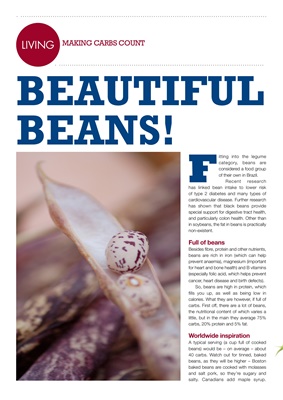
LIVING MaKInG CaRbs Count
Beautiful
Beans!
f
itting into the legume
category, beans are
considered a food group
of their own in Brazil.
Recent research
has linked bean intake to lower risk
of type 2 diabetes and many types of
cardiovascular disease. Further research
has shown that black beans provide
special support for digestive tract health,
and particularly colon health. Other than
in soybeans, the fat in beans is practically
non-existent.
Full of beans
Besides fibre, protein and other nutrients,
beans are rich in iron (which can help
prevent anaemia), magnesium (important
for heart and bone health) and B vitamins
(especially folic acid, which helps prevent
cancer, heart disease and birth defects).
So, beans are high in protein, which
fills you up, as well as being low in
calories. What they are however, if full of
carbs. First off, there are a lot of beans,
the nutritional content of which varies a
little, but in the main they average 75%
carbs, 20% protein and 5% fat.
Worldwide inspiration
A typical serving (a cup full of cooked
beans) would be – on average – about
40 carbs. Watch out for tinned, baked
beans, as they will be higher – Boston
baked beans are cooked with molasses
and salt pork, so they’re sugary and
salty. Canadians add maple syrup.